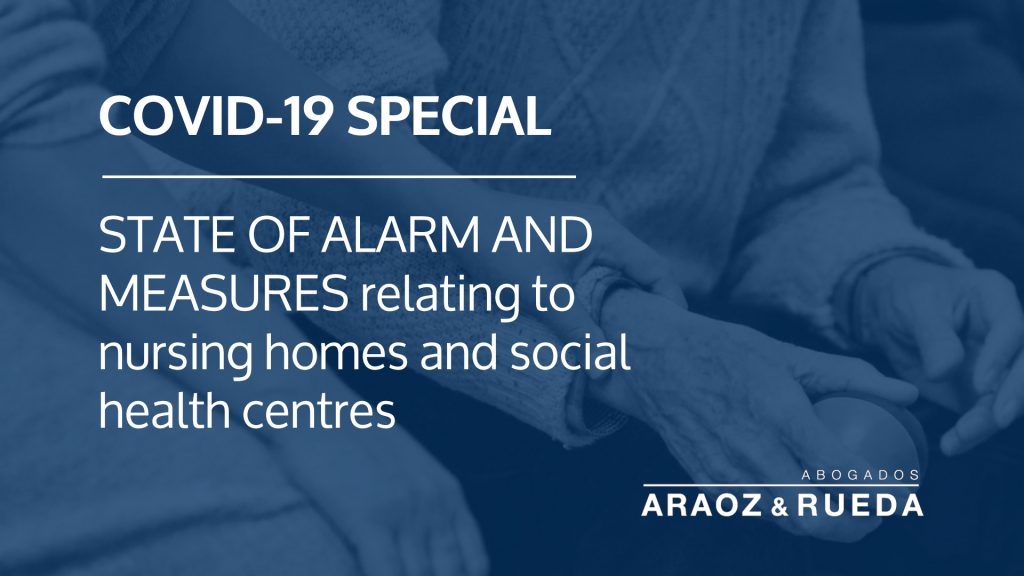Download the PDF document here
Royal Decree 463/2020 of 14 March, has declared a state of alarm throughout the Spanish territory for the management of the health crisis situation caused by the COVID-19 (“Royal Decree”), and provides a group of measures aimed at protecting the health and safety of citizens and strengthening the public health system.
The elderly, the people with disabilities or others who require care in nursing homes and other social health centres are in a situation of vulnerability to the COVID-19 infection. During the last week, the spread of COVID-19 among vulnerable people living in nursing homes has suffered an exponential and uncontrolled growth.
According to Article 12.6 of the Royal Decree, the Minister of Health may exercise the necessary legal powers with regard to privately owned health centres, services and health establishments. Accordingly, within the scope of the powers assumed, today, 23 March 2020, Order SND/265/2020 of 19 March was published in the Official State Gazette (BOE), adopting measures relating to nursing homes and social health centres, due to the health crisis situation caused by the COVID-19 (“Order 265/2020” or the “Order”).
These measures refer to questions of healthcare personnel, isolation and disinfection, but require specification by each Autonomous Community, to which the Order refers in a generic way. This Order enters into force with its publication, being applicable until the end of the declaration of the alarm state period or extensions thereof.
With regard to the specific measures contained in Order 265/2020, these may be divided into three main groups, being the following worthy to note:
Measures aimed at persons: measures relating to all the healthcare and non-healthcare personnel providing services in nursing homes and other social healthcare centres
- Workers who have direct contact with residents must follow the protective measures recommended by the Ministry of Health, according to the level of risk to which they are exposed.
- As far as possible, the number of workers in direct contact with a resident affected by a possible or positive case of COVID-19, as well as the time of their exposure, should be reduced to a minimum (it does not specify the number of workers or the minimum time of exposure).
Measures aimed at nursing homes and social healthcare centres: measures relating to i) the location and isolation of COVID-19 patients in nursing homes and other social healthcare centres and ii) the cleanliness of nursing homes and other social healthcare centres
1. The residents of the centres in which this order is applied must be classified in:
a) Residents without symptoms and without close contact with a possible or confirmed case of COVID-19.
b) Residents without symptoms, in preventive isolation by close contact with possible or confirmed case of COVID-19.
c) Residents with symptoms related to COVID-19.
d) Confirmed cases of COVID-19.
Please note that the above classification must be done in each centre urgently, and at the latest within one day of the publication of this order.
2. In the event that a resident has a mild acute respiratory infection, the resident must be isolated from the rest of the residents.
3. In the event that there is more than one resident with mild acute respiratory infection, and individual isolation is not possible, cohort isolation may be used, i.e. with other infected residents.
4. In the case of residents with a confirmed diagnosis of COVID-19, they should be isolated from the rest of the residents.
5. In the case of more than one resident with confirmed COVID-19 infection, cohort isolation may be used.
6. In any case, these residents, potential or confirmed cases of COVID-19, should be kept isolated from other residents.
7. In the event that the conditions of the centre allow it, vertical or plant isolation is preferable as a preferential regrouping criterion for each of the groups of residents indicated above. The centre must use the fire sectorisation already defined as the location area of each one of the groups indicated, unless this is not possible due to the size of the residence hall.
8. The centre must take special care of the maintenance in the isolation zone corresponding to those wanderers or errant persons with neurocognitive disorder, in order to allow them to move around without being able to leave that isolation zone, avoiding the use of mechanical or chemical restraints.
Measures aimed at healthcare providers and their relationship with patients: measures relating to healthcare providers in relation to healthcare in nursing homes and other social healthcare centres, coordination measures for the diagnosis, monitoring and referral of COVID-19 in nursing homes and other social healthcare centres and the National Health System
1. The health authority of the Regional Government may modify the provision of services by the medical staff, nursing or other health personnel employed by the nursing homes and other social health centres, regardless of whether they are publicly or privately owned, as well as the provision of services by such personnel employed in primary care or in hospital or specialized out-of-hospital care, where appropriate, to adapt them according to the needs of care in the nursing homes and other social health centres.
This is a very important measure, since it allows each Regional Government to have its own residential care centres, regarding both the activities carried out in the institution, the personnel developing the activity , as well as the procedure and information required for monitoring and/or managing the care of COVID-19 residents in these centres.
2. If the healthcare personnel, whether doctors, nurses or others, have had close contact with a possible or confirmed case of COVID-19 and do not present symptoms, they will keep on carrying out their normal activity as well as monitoring the symptoms.
3. The diagnostic test for confirmation should be performed on cases showing symptoms of acute respiratory infection in order to determine whether there is a possibility of infection with COVID-19.
Accordingly, the healthcare personnel of the nursing homes must contact the assigned primary care centre, which will proceed, if possible, in coordination with the doctor of the nursing home. After an initial assessment of the case and if it presents mild symptoms, the patient will remain in isolation in the nursing home, ensuring that the case is followed up. Nevertheless, if the criteria for referral to a health centre are met, the procedure established for this purpose will be activated.
However, although this competence is assumed by the Ministry of Health, Order 265/2020 establishes the jurisdiction of the qualified health authorities of each Regional Government to issue the resolutions, provisions and interpretative instructions that, according to their specific scope, are necessary to guarantee the effectiveness of the provisions of this order. Therefore, we must be aware these days of the specific measures that each Regional Government provides for the purpose of protecting the most vulnerable population from COVID-19 infection.





